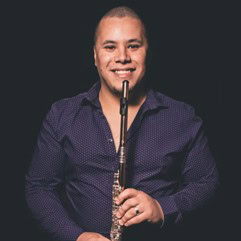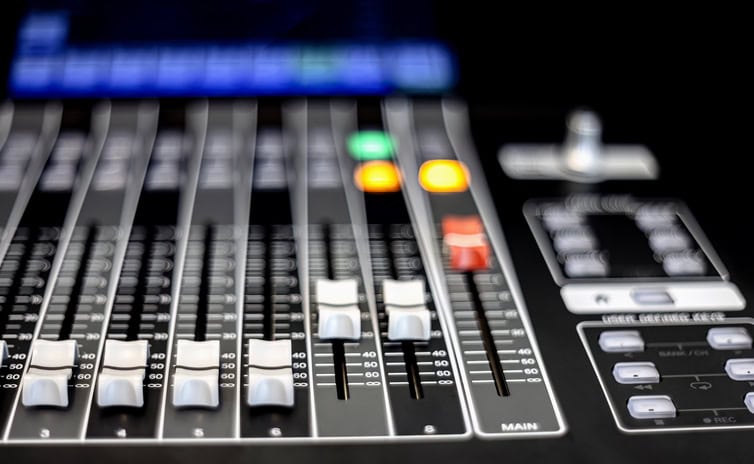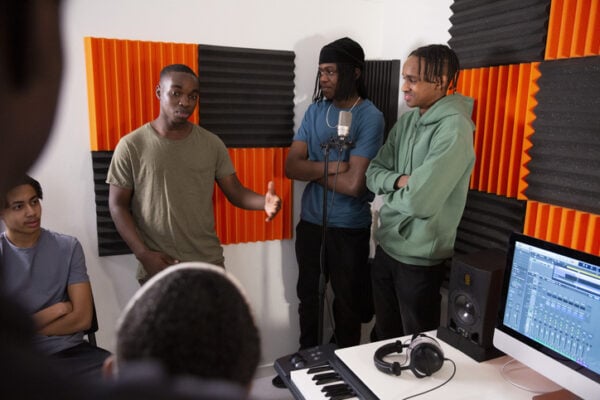/ News Posts / Project-Based Learning in Digital Musicianship
Project-Based Learning in Digital Musicianship
By NAfME Members Chris Shelton, Ph.D., and José Valentino Ruiz, Ph.D.
Abstract
This editorial explores how project-based learning enhances self-efficacy, technical proficiency, and career readiness in digital musicianship education, bridging the gap between academic instruction and industry demands.
The Shift in Digital Musicianship Education
Music production has undergone a revolution. What once required a multi-million-dollar studio can now be done on a laptop in a bedroom. With the right software, a decent pair of headphones, and a good understanding of digital tools, artists can create professional-quality music without ever stepping into a recording studio (Hugill, 2018).
Yet, despite this technological accessibility, many students entering music production programs lack confidence in their ability to produce, mix, or compose digitally. Traditional music education has long emphasized theory and performance while largely ignoring the practical, industry-specific skills necessary for success in today’s market (Myers et al., 2014). It’s like teaching someone music theory for years but never letting them pick up an instrument—useful, but not particularly practical when the goal is to actually make music.
So, what’s the solution? Project-based learning. When students engage in hands-on, structured coursework—working on real-world projects instead of just studying concepts—they develop the confidence, adaptability, and technical expertise needed to thrive in today’s industry. Instead of just talking about music production, they’re actually producing music, encountering real problems, and learning to solve them in a way that mirrors professional workflows (Shelton, D.C., 2024).
Why Confidence (Self-Efficacy) Matters in Music Production
Ask any music producer how they got good at what they do, and they’ll probably say something like, “I spent hundreds of hours messing up before I got it right.” Confidence—or self-efficacy, as psychologists call it—is one of the most critical factors in a student’s ability to succeed in music production (Bandura, 1997). It’s the difference between diving into a DAW (digital audio workstation) to experiment fearlessly and staring at the screen, afraid to press any buttons for fear of ruining everything.
When students go through a project-based music production course, they don’t just memorize terms like “compression” and “EQ”—they apply them. They learn by producing actual tracks, receiving feedback, and revising their work. Over time, this hands-on engagement builds confidence in their ability to work with software, create professional mixes, and develop their own creative style.
This shift is particularly evident among students who start with little or no background in music technology. Initially, they might struggle with the idea of producing an entire track, much like a beginner pianist staring at a Rachmaninoff concerto and wondering how on earth they’ll ever get their fingers to move that fast. But by the end of a structured, project-driven course, these same students often produce high-quality, industry-ready music—not because they memorized facts, but because they actually did the work.
Bridging the Gap between Education and the Music Industry
One of the biggest criticisms of music education is that it doesn’t always prepare students for the realities of the industry. Many graduates leave school knowing how to analyze a Bach fugue but having no idea how to record, mix, or distribute their own music—which, in today’s industry, is a huge disadvantage.
Project-based learning helps bridge this gap by making coursework mirror professional workflows. Instead of submitting theory papers, students produce actual music projects:
- Scoring a commercial or short film, learning how to sync music to visuals.
- Remixing a song, understanding how to manipulate stems and experiment with different sounds.
- Producing an original track from scratch, experiencing the entire process from composition to mixing and mastering.
The best part? Students leave the course with a portfolio of work—actual projects that can be shared with potential clients, record labels, or collaborators. In other words, they don’t just earn a grade; they build a body of work that has real-world value.
Common Student Mistakes in Music Production (and How to Fix Them)
Industry professionals evaluating student work often point out the same recurring issues:
- Timing (Quantization Problems) – Some students over-quantize everything, turning their music into something that sounds like a robot took over the studio. Others don’t quantize at all, resulting in rhythm sections that feel more like a drum circle gone wrong. The key is finding a balance—correcting major issues without eliminating all the natural feel of the performance.
- Mix Balance Issues – A common beginner mistake is making the kick drum so loud that it could single-handedly shake a stadium, while the vocals are so buried in the mix they sound like they’re trapped in another room. Learning proper mix balancing—using EQ, panning, and volume control—is a fundamental part of music production.
- Overuse of Effects – Reverb is great, but when overused, it can make a mix sound like it was recorded inside a cathedral from three blocks away. Learning when to use effects subtly is an essential skill.
- Lack of Iterative Feedback – Students who submit their first version of a project as their final submission miss out on one of the most crucial aspects of professional music production: revision. In the real world, producers don’t just mix a track once and call it a day. They listen, tweak, seek feedback, and refine.
Why Genre Exploration Matters in Digital Musicianship
One of the most interesting trends in music production education is how different genres affect self-efficacy. Students who enter a program already comfortable with pop, hip-hop, or electronic music tend to adapt quickly to digital tools, likely because these genres are heavily production-based. On the other hand, classically trained musicians sometimes struggle at first—adjusting to loop-based composition, synthesis, and modern production techniques can be a challenge.
But these same students often experience the greatest growth, expanding their musical versatility and developing a more diverse skill set. Encouraging students to work outside their comfort zone—having a jazz musician produce a hip-hop beat or a classical pianist compose an EDM track—pushes them to develop new creative instincts. The best producers are those who can adapt to different musical styles, a skill that is increasingly valuable in an industry where genre-blending is the norm.
The Future of Digital Musicianship Education
Music education has traditionally focused on theory, performance, and analysis—but in today’s industry, that’s not enough. Artists need to be producers, sound engineers, and business-savvy entrepreneurs. Project-based learning is one of the most effective ways to prepare students for real careers in music, giving them both technical proficiency and the confidence to apply their skills in a professional setting.
Rather than treating music production as an abstract concept, students should be immersed in the process, making mistakes, getting feedback, and improving through practice. The industry is constantly growing, and the best way to stay ahead is by learning through hands-on experience. The best producers aren’t just those with knowledge—they’re the ones who put in the hours, experiment, and learn by doing. Music education should reflect that.
References
Bandura, A. (1997). Self-efficacy: The exercise of control. W.H. Freeman.
Hugill, A. (2018). The digital musician (3rd ed.). Routledge.
Myers, D. et al. (2014). Transforming music study from its foundations. College Music Society.
Shelton, D. C. (2024). The Impact of a Student-Centered Curriculum on Self-Efficacy and Career Readiness in Digital Musicianship, Production, and Composition in a Digital Musicianship Course (Doctoral dissertation, University of Florida).
About the authors:
 NAfME member Chris Shelton, Ph.D. is a Visiting Professor of Music Production and Theory at Rollins College and formerly served as a faculty member in Music Business and Entrepreneurship at the University of Florida, as well as overseeing the Music Technology Lab at Berklee College of Music, where he facilitated resources to support visually impaired students learning music production and engineering. An award-winning composer, producer, and recording engineer, Chris’s accolades include the American Prize® for Chamber Music Composition for Serpent Mound, a Latin GRAMMY® Award winners certificate as a recording engineer for A La Fiesta de la Música Vamos Todos, the AIVA Communicator® Award, the Davey® Award, the Anthem® Award, and multiple Global Music® Awards in genres such as contemporary classical, funk fusion, Latin jazz, and vocal jazz. His works have been performed internationally by ensembles such as PHACE Ensemble, JACK Quartet, Transient Canvas, and Ensemble Dal Niente. Chris’s scholarly contributions include publications in Journal of Arts Entrepreneurship Education, Open Journal of Music Education, College Music Society’s Symposium Journal, and the National Association for Music Education.
NAfME member Chris Shelton, Ph.D. is a Visiting Professor of Music Production and Theory at Rollins College and formerly served as a faculty member in Music Business and Entrepreneurship at the University of Florida, as well as overseeing the Music Technology Lab at Berklee College of Music, where he facilitated resources to support visually impaired students learning music production and engineering. An award-winning composer, producer, and recording engineer, Chris’s accolades include the American Prize® for Chamber Music Composition for Serpent Mound, a Latin GRAMMY® Award winners certificate as a recording engineer for A La Fiesta de la Música Vamos Todos, the AIVA Communicator® Award, the Davey® Award, the Anthem® Award, and multiple Global Music® Awards in genres such as contemporary classical, funk fusion, Latin jazz, and vocal jazz. His works have been performed internationally by ensembles such as PHACE Ensemble, JACK Quartet, Transient Canvas, and Ensemble Dal Niente. Chris’s scholarly contributions include publications in Journal of Arts Entrepreneurship Education, Open Journal of Music Education, College Music Society’s Symposium Journal, and the National Association for Music Education.
 NAfME member José Valentino Ruiz, Ph.D. is an internationally acclaimed musician, entrepreneur, and educator whose groundbreaking contributions span performance, production, composition, and arts leadership. A four-time Latin GRAMMY® Award winner, four-time Latin GRAMMY® Award Nominee, EMMY® Award recipient, and record-holding DownBeat® and Global Music® Award winner, he has headlined more than 1,400 concerts worldwide, performed at prestigious venues such as Carnegie Hall, and collaborated with legendary artists across multiple genres including Chick Corea, Paquito D’Rivera, Alex Acuña, Aaron Neville, and many more. As Founder and CEO of JV Music Enterprises, Dr. Ruiz leads a pioneering music company that produces award-winning albums, media scores, and innovative educational programs. His influence extends beyond the stage, serving as an expert columnist in music business and creative enterprise leadership, a tenured professor of music business and entrepreneurship at the University of Florida, and a consultant to Fortune 500 companies. Driven by a passion for excellence and innovation, he continues to shape the future of the music industry through his artistry, scholarship, and entrepreneurial vision.
NAfME member José Valentino Ruiz, Ph.D. is an internationally acclaimed musician, entrepreneur, and educator whose groundbreaking contributions span performance, production, composition, and arts leadership. A four-time Latin GRAMMY® Award winner, four-time Latin GRAMMY® Award Nominee, EMMY® Award recipient, and record-holding DownBeat® and Global Music® Award winner, he has headlined more than 1,400 concerts worldwide, performed at prestigious venues such as Carnegie Hall, and collaborated with legendary artists across multiple genres including Chick Corea, Paquito D’Rivera, Alex Acuña, Aaron Neville, and many more. As Founder and CEO of JV Music Enterprises, Dr. Ruiz leads a pioneering music company that produces award-winning albums, media scores, and innovative educational programs. His influence extends beyond the stage, serving as an expert columnist in music business and creative enterprise leadership, a tenured professor of music business and entrepreneurship at the University of Florida, and a consultant to Fortune 500 companies. Driven by a passion for excellence and innovation, he continues to shape the future of the music industry through his artistry, scholarship, and entrepreneurial vision.
Interested in reprinting this article? Please review the reprint guidelines.
The National Association for Music Education (NAfME) provides a number of forums for the sharing of information and opinion, including blogs and postings on our website, articles and columns in our magazines and journals, and postings to our Amplify member portal. Unless specifically noted, the views expressed in these media do not necessarily represent the policy or views of the Association, its officers, or its employees.
Published Date
March 13, 2025
Category
- Careers
- Innovation
Copyright
March 13, 2025. © National Association for Music Education (NAfME.org)





